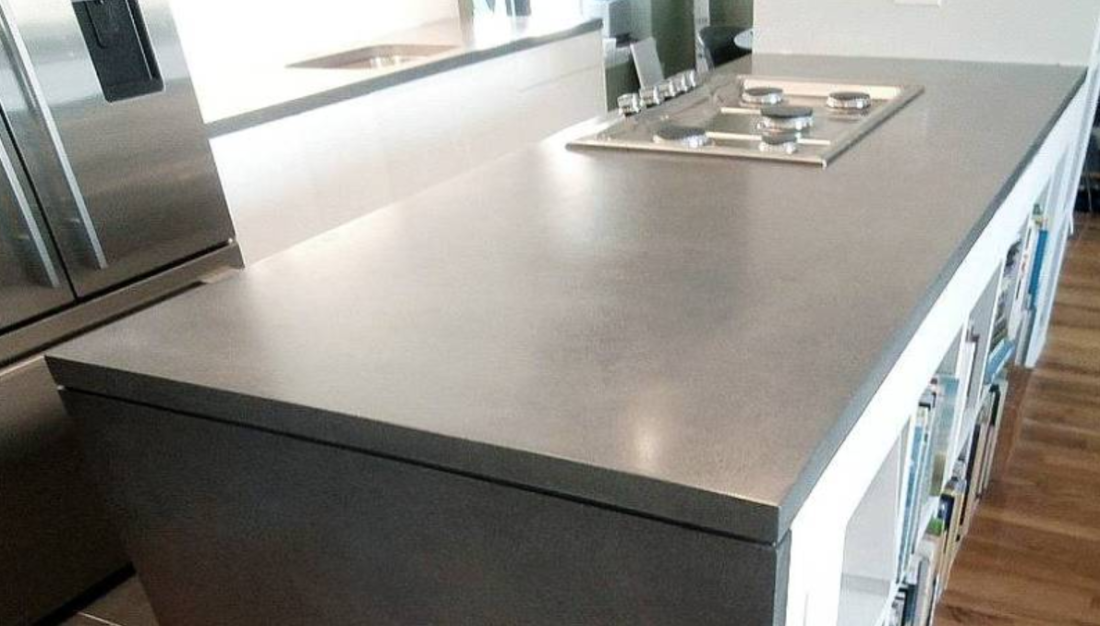Gone are the days when options for kitchen countertops were limited. Probably laminate and butcher block countertops were the two key choices available a decade ago. However, in 2022 you have more options than ever. Concrete countertops are one of the popular options among homeowners nowadays.

Pinterest – the universe of beautiful ideas and “Fixer Upper” stars could be held responsible for the popularity of concrete countertops in modern kitchen designs. Are you also the one who took inspiration from these sources? Well, you are not alone. Nowadays, many other people are in the same boat as you are.
Concrete countertops in the modern age are no longer the boring gray-colored slabs – rather, they come in attractive designs with a touch of warmth. Without any doubt, concrete kitchen countertops are functional and have the power to add sophistication to your modern kitchen.
However, it is important to know a couple of things before investing in concrete countertops. This post will discuss the advantages and disadvantages of concrete countertops to help you make the right decision.
Take a look at this detailed guide to stone countertops.
Pros of concrete countertops
There are many perks when it comes to investing in concrete countertops, a few are listed below:
● Excellent durability
Concrete is solid and super hard, and hence it is an appropriate material for kitchen countertops. It is scratch and abrasion resistant which means you can enjoy concrete countertops for a long time in your kitchen. Additionally, if you notice a scratch on your countertop, the chances are high that it is the seal that got affected and not the concrete itself.
● Endless styles
When you hear the word “Concrete”- gray color will come to your mind – and yes, for all the obvious reasons. Interestingly, the scenario is entirely different when we talk about concrete countertops. They are available in several colors and styles, and you can choose a design that matches your kitchen’s theme. Isn’t it amazing?
● Easy to customize
You can get a customized kitchen countertop with your choice of pigments or stains. With pigmentation, you can have a countertop in any color that you want. Whereas the staining process can help give a natural stone’s look to your concrete countertop.
That’s not it! There’s more about concrete countertop customization.
The ‘ customization ‘ factor has significant importance when it comes to poured concrete countertops pros and cons. If your kitchen’s layout is unique and a one-size-fits-all, ready-to-install surface won’t fit in, you can get it customized with concrete. The reason is – concrete is the material that can be poured seamlessly to fit any shape. Cool, isn’t it?
● Premium surface
From creating artfully sculpted surfaces to sophisticated yet luxurious countertops, concrete is considered the premium material that adds great value to your home.
Installing sinks and drains is easy: Concrete countertops make it easy for the contractors to install the sinks and drains. It doesn’t cause any damage to the surface because usually, the contractors work on these things before pouring countertop concrete.
● Heat-resistant
One can vouch for concrete countertops over certain other surfaces because it is highly resistant to heat. If your place has hot climates, then concrete countertops can be one of the best options to opt for. However, you should avoid keeping the hot vessels directly on the surface because sealants and pigments can get damaged.
● Add symmetry to your kitchen
If you are looking for something with the ability to tie the kitchen’s look and feel together with other elements such as flooring and walls, concrete countertops can be the right choice.
Cons of concrete countertops
Like any other countertop material, concrete surfaces also have some cons listed below.
● Heavy on the pocket
Concrete countertops are handmade and require a significant amount of time, effort, and manual labor, and this is the reason they come at the pricier side. Your contractor’s quotes for concrete countertop installation may sometimes exclude the labor charges. Therefore, it is important to clear everything beforehand.
● Installation consumes time
As you already know, concrete countertops are custom-made, so the overall time required until you can start working on your kitchen surface is relatively higher than other readymade countertops. After the installation, concrete countertops may take 7-10 days to completely dry. Keep in mind this waiting time can increase if you live in humid or rainy areas.
● Require maintenance
Cemented countertops are known for their exceptionally well durability, but they require regular maintenance to maintain their beauty. When looking for the pros and cons of concrete countertops, this point is of utter significance because some people may not be interested in investing their effort to maintain its beauty.
The concrete countertops are highly vulnerable to food stains, so you need to reapply an appropriate sealer and wax to protect the concrete kitchen surface. Additionally, always ensure to wipe off water, lemon, or other food stains immediately to prevent stains.
● Cracks
Obviously, if we are talking about cemented countertops, the problem of cracks can’t be ignored. It is a widely known fact about cement. So if a few small cracks here and there don’t bother you, go for it!
Closing words
Are you someone who wants to have a kitchen countertop that lasts more than a decade? If yes, concrete countertops will be the right fit for you. Also, a concrete countertop will be your only option if your kitchen has a unique design because these are easier to hand-craft as per your requirements.
We hope that our list of pros and cons of concrete countertops will help you make an informed decision.




